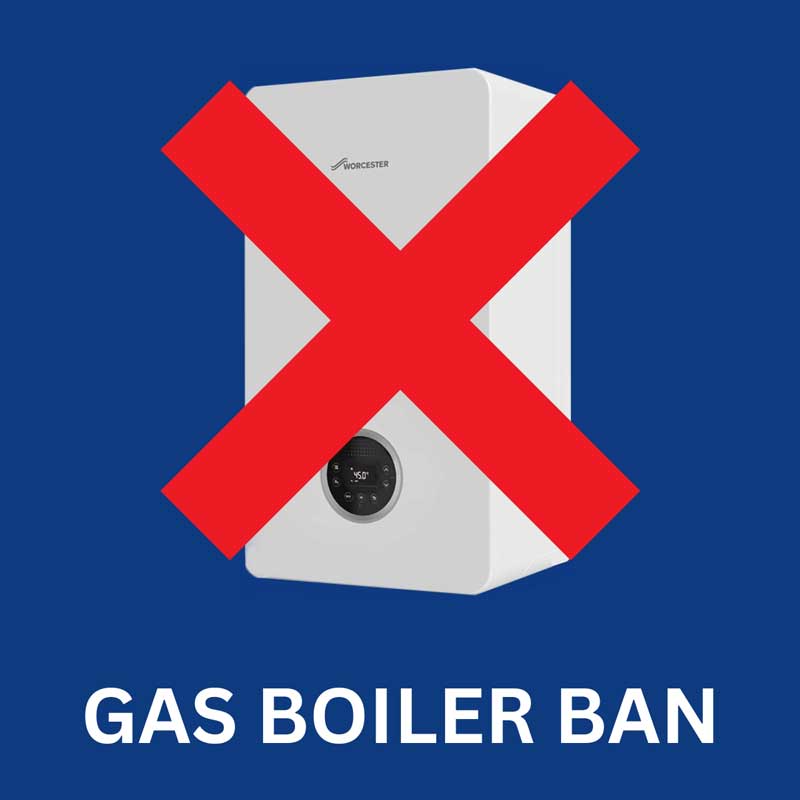
What is the ‘Gas Boiler Ban’, and as a UK homeowner, should you be concerned? This article will explain the Gas Boiler Ban and answer any questions or concerns you may have.
What Is The Gas Boiler Ban?
The “Gas Boiler Ban” refers to measures taken by some countries, including the UK, to phase out the use of gas boilers in homes and businesses as part of efforts to reduce carbon emissions and combat climate change.
The rationale behind the ban is that gas boilers, which burn natural gas to produce heat, release carbon dioxide (CO2) into the atmosphere, contributing to global warming.
Several countries, including the UK, have proposed or enacted regulations to phase out or reduce the use of gas boilers, replacing them with more sustainable alternatives such as heat pumps, solar thermal systems, and biomass boilers.
What Is The UK Gas Boiler Ban Deadline?
The UK government has announced plans to phase out the installation of new gas boilers by 2035. This date has recently been extended. The original date was 2026.
Will I Have To Replace My Gas Boiler In 2035?
Under the current proposals, if you have a functioning gas boiler in 2035, you will not be required to replace it immediately. However, once it reaches the end of its life, you’ll need to install an alternative solution, such as an electric Boiler or heat pump.
Will It Be Illegal To Own A Gas Boiler After 2035?
No, owning a Gas Boiler will not be illegal after 2035. The UK government’s plans regarding banning Gas Boilers have not suggested it would be illegal to own a gas boiler after 2035. The proposals are about phasing out the installation of new gas boilers by 2035.
Will The UK Boiler Ban Date Be Pushed Back Again?
The UK Boiler ban will likely be pushed back again. The government’s aim of achieving net zero by 2050 is looking increasingly unlikely.
The government wants homeowners to switch from Gas Boilers to alternatives such as Heat Pumps or electric Boilers, both of which are powered by electricity.
Currently, 74% of UK homes are heated by Gas, while 9% are heated by electricity and 3% by oil.
That’s a lot of homes that need to convert from Gas (and oil) to electricity for their heating, and even if every home did switch in time, it’s highly questionable the UK could generate enough extra electricity to power the switch.
If there’s significant public resistance or concerns about the infrastructure’s readiness, the industry or economic challenges, such as recessions or other unexpected disruptions, the Boiler ban might be pushed back further.
Also, there’s the capacity of the industry to manufacture, distribute, and install alternative heating solutions at scale. If manufacturers can’t meet demand, have supply chain issues or other challenges, it could impact the deadline also.
What Are The Alternatives To Gas Boilers?
Here are some alternatives to Gas Boilers.
Heat Pumps
Heat pumps are being touted as the main alternative to Gas Boilers. There are two types.
Air Source Heat Pumps
Air Source Heat Pumps extract heat from the outside air (similar to how fridges extract heat from the inside). The heat is used to warm water for radiators or underfloor heating.
Ground Source Heat Pumps
Ground Source Heat Pumps use pipes buried in the garden to extract heat from the ground. The principle is similar to Air Source Heat Pumps but more efficient due to the consistent ground temperature.
Electric Boilers
Electric Boilers are similar to Gas Boilers but use electricity to heat the water. They are 100% efficient in converting electricity to heat, but the overall carbon footprint depends on how the electricity is generated. If the grid becomes greener, so does the operation of electric boilers.
Solar Thermal Systems
Solar Thermal Systems use solar panels installed on the roof to collect heat from the sun and use it to warm water stored in a hot water cylinder.
Biomass Boilers
To provide heat, biomass boilers burn organic materials, typically wood pellets, chips, or logs. While burning biomass does release carbon dioxide, it’s roughly the same amount that the plants absorbed during their growth, making it more carbon neutral than fossil fuels.
Hydrogen Boilers
Hydrogen can be burned to produce heat without emitting carbon dioxide (only water vapour). This makes Hydrogen Boilers a potential low-carbon replacement for gas boilers.
The challenge, however, is producing green hydrogen at scale and cost-effectively.
Will The Alternatives To Gas Boilers Be More Expensive?
Yes, in most cases, the alternatives are more expensive than Gas Boilers. Gas Boiler installations start at around £1400. Here’s what the alternatives start at:
Heat Pumps
Air- and ground-source heat pumps have higher upfront costs than traditional gas boilers. Ground source heat pumps, in particular, require significant groundwork, which can be expensive.
Heat pump installations start at around £8000
Solar Thermal Systems
The cost of installing solar panels and associated systems can be more than a Gas Boiler installation (depending on the installation/system), especially if retrofitting to an existing property.
Solar Thermal System installations start at around £3000
Biomass Boilers
The initial cost of Biomass Boilers is higher than that of Gas Boilers. Prices start at around £8000
Electric Boilers
Electric Boilers often have a lower installation cost than heat pumps, but they are not as efficient in running costs, especially when electricity prices are high.
Electric Boiler installation costs start at £1000
Hydrogen Boilers
Initial costs might be higher as a newer technology, but they could decrease as the technology matures and becomes more widespread.
The typical Hydrogen Ready Boiler installation cost starts at around £2500.
Running Costs
Here’s how the alternatives to Gas Boilers compare regarding running costs.
Heat Pumps
Heat pumps have lower running costs than Gas Boilers, especially if you’re replacing an older, less efficient Boiler. The efficiency of a heat pump can be 3-4 times that of conventional Boilers.
Solar Thermal Systems
Once installed, the running costs are minimal, as sunlight is free. However, the system will most likely require backup heating during periods of low sunlight.
Biomass Boilers
Wood pellets or logs cost can vary based on supply and demand. It can be competitive, especially with cheap and sustainable wood supply access.
Electric Boilers
If electricity prices are high, running costs can be significantly more than running a Gas Boiler. However, electricity prices might stabilise or decrease as the grid becomes more renewable.
Hydrogen Boilers
The running costs will depend on the price of hydrogen, which is currently more expensive than natural gas but might decrease with economies of scale and advancements in green hydrogen production.
Conclusion
As a homeowner with a Gas Boiler, you don’t have to worry about the ban.
At the time of writing, the ban won’t come into effect for another 12 years, and between now and then, there’s a very good chance the ban will be pushed back or scrapped altogether.
Currently, Gas Boilers are the cheapest and most effective method of heating UK homes, and you still have plenty of time to enjoy your Gas Boiler.
Even if the ban does come into effect in 2035, you can get a new Gas Boiler installed near the deadline, and as modern Gas Boilers last 12+ years, you can still enjoy many years of a Gas-heated home past the Boiler Ban deadline.

Hi, I’m Terry, the founder and owner of TM Hughes & Son Gas Services
Please get in touch to book an appointment or receive a free, no-obligation quote
Call – 01245 830075
Email – info@tmhughesandson.uk
0% Finance
For Boiler Installations & Repair
